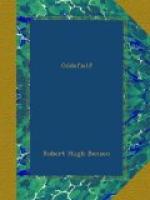“Armed with a cleaver,” said I, “which he presently flung at my head.”
“So Mr. Mallock says,” observed the Colonel.
“You say I am a liar?” I cried.
The King struck suddenly upon the table.
“Silence, sir!” he said. “Mr. Chiffinch, you told me before that you had something to say. You had best say it now.”
I fell back, for I saw that my bolt was shot. If Chiffinch could not save me, no man could. It was gone clean beyond mere misprision of treason now: I saw that plain enough.
Then Mr. Chiffinch began; and I am bound to say that he shewed himself a better pleader than myself. I thanked God, as he spoke, that I had treated him with patience just now in his lodgings.
First, he remarked that I had been in His Majesty’s service now for near six years, and that in all that time I had proved myself loyal and faithful. Then he proceeded to deal with the charges.
First, he said that the very weakness of my excuse with regard to the paper was my strength. If I were indeed the villain that I seemed, why in God’s name had I not destroyed the paper? I had had near five years to do it in! Was not that an additional sign that I had, as I said, merely forgotten it? (As be said this I marvelled that I had not thought of that answer myself.) It was true that the paper was of the highest importance, but, as my story stood, I had not known that. Should not my word then be taken, considering all the other services I had done to His Majesty?
With regard to the second point, first let them divest their minds of any prejudice caused by the first; for the first was not proved. Having done that, it was necessary to remember how carefully I had reported every movement of the King’s enemies to himself—Mr. Chiffinch. It was true that there had been found other papers in the hiding-hole which he himself had not seen, but he had at least known the substance of them—except of course of the cypher of which he had already treated. With regard to the affair at the Rye it was necessary to remember that my policy throughout had been to report all that I had learned and to interpret it as directly contrary to the truth; and that this policy had proved successful. (I saw the Colonel give a very odd look as this was said; and I saw that Mr. Chiffinch had seen it too.) At the worst it had been an error of judgment on my part that I had recommended the road by the Rye; but it was an error that had had no bad consequences; and to have recommended it was only in accordance with all my policy of taking as true the precise opposite to all that the conspirators had told me. So far as my policy was sound, all that I knew was that the Rye road would be safe on that one day; of the Royston road I knew little or nothing. As regards the incident of the cleaver, I had spoken of that to him immediately I returned to town; and, surely, it was true that a single man with a cleaver could do very little damage to a galloping coach. In short, though the evidence might be interpreted as against me—(here he shot a look at the Colonel)—it might also be interpreted for me, and, that this was the fairer interpretation, he pleaded my record of other services done to the King.




